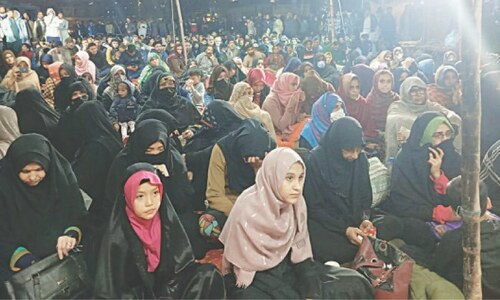KARACHI: Children from across Pakistan came together to speak up for their rights at a World Children’s Day commemoration held at the Arts Council of Pakistan, Karachi, asking decision makers to translate their commitments on child rights and climate change into reality.
Talented child musicians, performers and child rights champions shared their demands, hopes and dreams for the future through songs, words, and theatre.
“Climate change threatens our world, and we are worried about our future,” said Taqwa Ahmad, a Unicef youth advocate in Pakistan. “Our voices are often silenced, and our rights are ignored. Our demands are simple yet significant. Listen to our concerns, value our emotions, and respect our rights. Take climate change seriously and turn your words into action.”
World Children’s Day is Unicef’s global day of action for children by children, marking the adoption of the Convention on the Rights of the Child (CRC) in 1989, the most widely ratified human rights treaty in history.
On World Children’s Day event, activists ask decision-makers to translate promises of child rights into reality
Pakistan was the sixth country to sign the CRC on Nov 12, 1990, affirming its commitment to promote, protect and fulfill child rights. Yet many rights remain out of reach for children and adolescents.
Pakistan has one of the highest neonatal mortality rates in the world, around 40 per cent of children are out of school and over 40 per cent of them under five are malnourished.
“Urgent attention is needed to tackle pressing issues such as 26.2 million out-of-school children, high rates of malnutrition, and lack of safe water access for millions, among others. We must renew our commitment to ensure that all children can grow in safe, nurturing environments,” said Sindh Chief Minister Syed Murad Ali Shah.
A staggering 80-85 per cent of children experience violent discipline in Pakistan. Recently, the government of Pakistan pledged to end all forms of violence against children by 2027 at the Global Ministerial Conference on Ending Violence Against Children in Bogotá, Colombia.
“Today, I have seen the extraordinary talent, passion and vision of children in Pakistan. We need to ensure that girls and boys are given their rights, such as the right to health, to food nutrition, to protection, to clean water, to education… so they can survive, grow healthy and become educated,” said Mohamed Yahya, a UN resident coordinator in Pakistan.
According to Unicef’s 2021 Children’s Climate Risk Index, children and young people in Pakistan face ‘extremely high risk’ from climate-related threats. Floods, heatwaves and air pollution have suspended schools in different parts of Pakistan this year, reducing children’s opportunities to learn while the country grapples with an education emergency.
“Children make up almost half of the population of Pakistan, but they are rarely considered in the decisions that affect their futures. We need urgent action to uphold children’s rights and ensure every child has the opportunity to thrive,” said Abdullah Fadil, a Unicef representative in Pakistan, adding that as world leaders travelled to Azerbaijan for COP29, children were calling upon adults today to wake up to the climate crisis and prioritise their futures before it’s too late.
Focus on polio threat
Earlier in the day, the chief minister a held a follow-up meeting with Unicef and UN officials where they discussed ways to effectively tackle the polio threat in the province.
The chief minister stated that currently 20 districts were affected in the province with 13 confirmed cases and that 66 per cent of tested environmental sites were positive for the wild poliovirus.
Mr Abdullah Fadil, acknowledging vaccine hesitancy as a challenge, said that the Sindh government’s strategic Social and Behavioral Change Communication (SBCC) programmes to boost awareness and encourage vaccination would be helpful in that respect.
The chief minister responded by saying that parliamentarians were being engaged to support vaccination teams in areas where refusal rates were high.
“Our robust surveillance system along with coordinated routine immunisation (RI) efforts will help respond quickly to new cases,” he said while describing the upcoming vaccination campaigns in December as critical.
Published in Dawn, November 13th, 2024
















































Dear visitor, the comments section is undergoing an overhaul and will return soon.